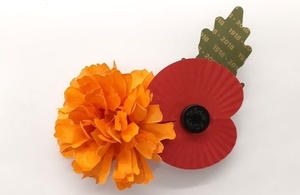India and UK commemorate fallen soldiers in World War 1
Marking 100 years since Armistice Day, the United Service Institution of India, supported by the British High Commission, is hosting a series of events over the weekend of the 11th November, to commemorate the contribution of the Indian Army to World War One.

India’s role in the War was significant - over 1.3 million Indian servicemen fought in theatres across Europe, the Middle East and East Africa, making the Indian contribution one of the largest in the Commonwealth and the most widespread. India also contributed over $20 billion in today’s money to the war effort, including 3.7 million tonnes of supplies and 170,000 animals.
To commemorate this massive contribution and to remember the sacrifice of all servicemen and women throughout the War, the United Service Institution of India (USI) and the British High Commission are jointly hosting the following events:
Friday, 9th November
Historical Seminar: “India and the Great War in Research, Memory and Commemoration - Indian contribution to WW1”. The event is supported by the UK National Army Museum and will feature guest academic speakers from India, UK, Canada and Australia.
Saturday 10th November
Sunset Music Concert by the Band of the Brigade of Gurkhas and members of the Nottinghamshire Band of the Royal Engineers at the residence of Sir Dominic Asquith, British High Commissioner to India. Followed by an evening reception during which War Diaries from Indian Regiments that fought in World War 1 will be presented by Tom Tugendhat MP, Chair of the Foreign Affairs Committee and former army officer, to the Indian Army.
Sunday 11th November
Multi-faith Service of Remembrance at Delhi War Cemetery.
Tugendhat said:
I’m privileged to be here in India for this important moment, and to have the opportunity to pay tribute to those who lost their lives in the cause of freedom – including more than 74,000 men who did not return home to India. India’s remarkable contribution to the war effort must be recognised, because it changed the course of history.
Squadron Leader Rana Chhinna, Secretary and Editor Centre for Armed Forces Historical Research of USI institute said:
It is a matter of great pride that the very significant Indian contribution to the war that changed the course of modern history is finally getting the recognition that it so richly deserves. The Indian soldier deserves an acknowledgement of his contribution, and a commemoration of his sacrifice, making clear his central place in history.
Our joint commemorative efforts with the United Kingdom are an act of Remembrance and Commemoration that highlights both our shared values, and our shared heritage.
Defence Advisor to the British High Commission, Mark Goldsack, said:
Remembrance is our opportunity as a society to recognise the sacrifice made by all soldiers, on all our behalves, irrespective of their backgrounds. It is not about the politics of the conflict, it is about honouring the self-sacrifice of those who paid the ultimate price.
This is the culmination of a substantial four year project to recognise and highlight India’s contribution to World War One. The High Commission has been working in association with the United Service Institution of India to arrange these events to mark the centenary of the Armistice.
As part of the commemorations, USI have chosen the marigold as a symbol of remembrance for India - selected for its prolific nature within India and its colour, saffron, which represents sacrifice.
Further information
A War Diary is an official record of events maintained during conflict. It will include routine orders, operational orders and administrative orders. In effect a historical record of the Regiment’s life on the front.
Eleven Victoria Crosses (the highest award of the British honour system) were won by Indian soldiers in World War 1: two of these were Nepalese nationals and three were soldiers born in areas that are today part of Pakistan.
Over 1.3 million Indian servicemen fought in World War 1 and there were over 70,000 fatalities.
The Indian Army dominated, but the Indian Navy also contributed and Indians served in the Army Flying Corps. There were also labour battalions recruited from Bengal.
The Indian Army has the distinction of having fought in almost all theaters of the war – France and Flanders, alongside the ANZACs at Gallipoli, Mesopotamia, Palestine and North Africa.
World War 1 started 28 July 1914 and finished on 11 Nov 1918. It involved all of world’s great powers, 70 million combatants, and saw more than 9 million killed. Armistice Day refers to the armistice treaty signed by the Allies and Germany on November 11th 1918.
British Deputy High Commissions across India will mark the anniversary with separate events.
Media
For media queries, please contact:
Sally Hedley, Head of Communications
Press and Communications, British High Commission,
Chanakyapuri, New Delhi 110021
Tel: 24192100; Fax: 24192400,
Mail to: Upendra Singh and Bhanushali Gahlot